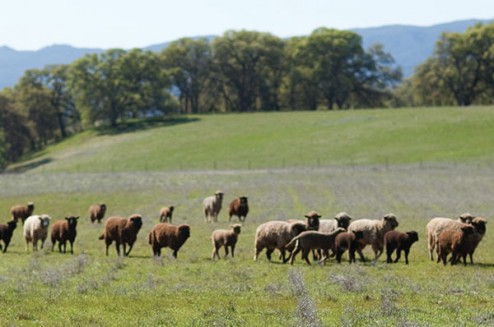
This Saturday, November 16th is Fibershed's 2nd Fine Wool & Fiber Symposium in Point Reyes Station.
Fibershed is a local non-profit dedicated to using materials grown and processed within 120 miles to make clothing. As Fibershed is very conscious of ecology and the climate - this year's focus is on clothing and the climate. It is great to wear clothing made out of materials grown in the area - though there is still a lot to discuss regarding how those materials are grown and harvested. Fibershed promotes the creation of materials locally - and - that are created as sustainably and consciously as possible in light of preserving the environment. Presently, the symposium is sold out. Though for the first time, you can watch the symposium streamed live over the internet.
Don't let the fact that the symposium is sold-out stop you from taking a day trip out to Point Reyes Station. There will be a pop-up shop featuring materials raised by and products made by Fibershed members. Here is a list of those participating.
A few weeks back, I led a community indigo dip using indigo grown locally by Fibershed members. We used naturally colored brown organic cotton fabric. The cotton in this fabric was raised by Sally Fox. We used Sally's cotton because it is beautiful and because it has been raised in California - within this Fibershed. Afterwards, I received an email from an attendee at the indigo dip. She expressed her disappointment wishing that we used white cotton so she could see the indigo blue better. I see the attendee's point - though feel strongly that we create space and use what is available regionally. In some ways, the indigo event was an assessment of what we currently have to offer in this region. Some are happy with what we have, others desire more (and some have never even considered our region as a place to obtain textiles and materials).
Watching the symposium streaming live and / or coming out to the pop-up shop are two ways in which we can actively participate and contribute to our Fibershed - in products that we would like to see developed further. It is the people who are at the symposium and the pop-up shop who have committed themselves to this process, who need our support, and who I am sure would love to hear what types of things you are looking for. For instance, if enough people desire white cotton fabric, then we as a community could come together and help create that white cotton fabric.
We are so used to having everything, or nearly everything, or what we think is everything available to us. When really, there are so many great things available to us that we don't think have value or are unaware of their value. Or have gotten used to the shoddy quality of what is available to use that we have forgotten what beautifully woven cotton or linen feels like. Keeping an open mind is so important in the aliveness in the practice of making especially when giving consideration to the sustainability and the environment. By listening to the process, treating it as a journey, you will inevitably make something beyond your original conception, filled with people and places, and beautiful.
If we would like to see things change, less abuse of labor practices, more consciousness when working with the Earth, and simply all around better materials, transitioning from consumers of fiber, yarn, and fabric - those unattached to the people or place of where a material is grown and gathered - into community members who invest in fiber, yarn, and fabric grown locally or grown by a group of people you know and respect is how we can come to see change.
Currently, to have fabric milled in the USA, it is tens of thousands of dollars. Either consumers and business owners are going to have to come together and commit to one another in order for these types of things to make progress or a very large corporation can own the process. Sometimes during the early stages of a movement or of a business, we know we believe in their practice or in their establishment though they don't carry what we want or what we think we want. Sometimes, in order to support the businesses and institutions who carry our ideal ethics, means making compromises in what we want, for what they currently have, and requesting what it is that we do want to see. It is a process and an evolution. One that we all must participate in for change to occur. We might have to use brown cotton fabric until white cotton fabric becomes available. Even though I might desire white cotton, I know that by investing in Sally's brown cotton could mean we are one step closer to one day getting white cotton fabric. Especially if I tell her, along with my investment in her brown cotton fabric, that this is something I would like to see in the future.
I am intrigued by the creative means in which we could help people who are trying to make the change to longstanding ways of doing business. CSAs would be one example of creative business models in which some organic food growing farms have come to thrive. In this model, the consumer becomes a community member by prepaying and investing in the farm. How could these models evolve to help textile material growers establish their businesses? How can people come together, to decide on a body of materials they would like to see cultivated in the region, and then help share the heavy burden of making these materials. It's an interesting and complex quagmire.
I am looking forward to the lively and engaging discussion at this year's Fibershed Symposium. Will I see you there?
